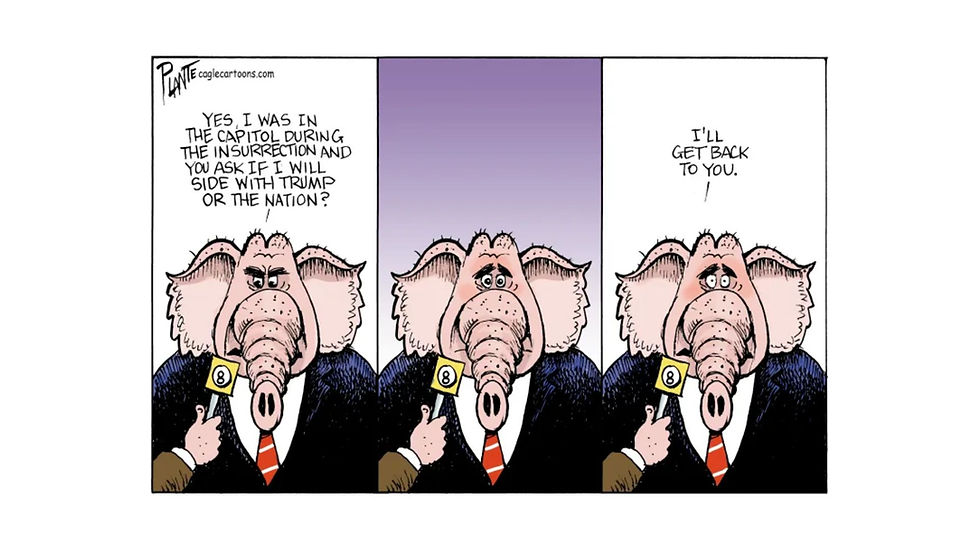Making social media safe for everyone
- Sree Sreenivasan

- Feb 16, 2023
- 3 min read
President Biden is right to call out social media companies for targeting and harming young people.

Cartoon by Christopher Weyant @ChristophWeyant
(This is the opening essay from this week's edition of my Sunday Note, which is brought to you by Armory Square Ventures. See their message in this issue of the newsletter.)
PRESIDENT BIDEN CALLED OUT SOCIAL MEDIA COMPANIES in his State of the Union address last week, and we should all take notice.
Here is the brief clip in which he outlines his ideas for limiting what social media companies can do with data from children’s social media usage.
This is a good step, and it’s important that the president would use a platform like this to discuss the issue. It was also near the end of the speech and lasted just a few seconds. There are, of course, some legislative ways to make social media safer — although I’m not sure that age restrictions would really do much, and data collection rules have proven largely toothless.
It’s easy to agree with broad statements like this one from Colorado Senator Mike Bennet:
Speaking as a parent who’s raised three daughters in this era, we certainly have not agreed to run a science experiment on our children with machine learning algorithms, the effects of which almost no employees at the social media companies themselves even understand.
But, where does that get us? Algorithmic feeds tend to produce adverse effects — the “if it bleeds, it leads” of the modern age for sure — but, even if Meta were banned from collecting data on users between the ages of 15 and 18, it would do essentially nothing to curb any of social media’s real ills.
Depriving some global brand of ad-targeting data just means that teenagers won’t see ads for those things, and ads are not the problem. The problems are bullying, body- and image-shaming, and other things that are happening with and among real people in the real world. Facebook, Instagram, and independent researchers have known for years that their platforms can cause deep, lasting negative mental health effects on young people.
This short video from Stanford University does a great job of breaking down exactly what social media does to our brains, why it’s addictive, and how social comparison is the real fuel of the anxiety fire.
The healthiest choice is probably something between quitting social media outright and limiting social media access to certain times for specific (short) amounts of time. But, I think it’s worth considering the reality for most modern teenagers — all, or close to all, of their friends are very likely not going to be subject to those same rules, they may suffer socially because of them, and we may just make it worse.
The answer, to me, starts at home. We, as parents, aunts and uncles, mentors, and role models, need to instill respect and empathy in our children and the young people around us. We need to teach them that bullying is wrong, be it in the hallway, on the timeline, and in the group chat.
According to research from Pew, conducted in 2022, teens offered a wide range of responses to questions about their social media usage and the effects of it. Many, and in some cases most of them, actually see social media as a largely positive aspect of their lives. These digital spaces let them connect with friends, find wider communities around their beliefs and interests, and it offers an emotional outlet they may not have offline. Interestingly (and, perhaps, predictably) there is some dissonance. There’s definitely a sort of “I’m fine with social media, but other people are suffering because of it” thing going on.

It’s not hard to see the parallels for us adults. Our “always on” world is not exclusive to certain age groups — it’s affecting all of us. As such, all of us need to band together to get ourselves right.
Logging off for meaningful periods of time, regularly, may indeed be a good place to start. So are turning off notifications and occasionally grayscaling your phone. But, digital life is here to stay, and we simply need to take control of it. We can blame social media companies all we want — and they certainly deserve some blame — but ultimately, we’re the ones agreeing to the terms of service (most of the time, without even reading them). We’re the ones posting. And, we’re the ones setting examples for the generations coming after us.
Thank you for the incredible response to last week’s essay that Zach and I wrote about losing our mothers at 18 and 52 respectively. Your comments, notes and stories showed us that you are not alone. 🙏


Comments